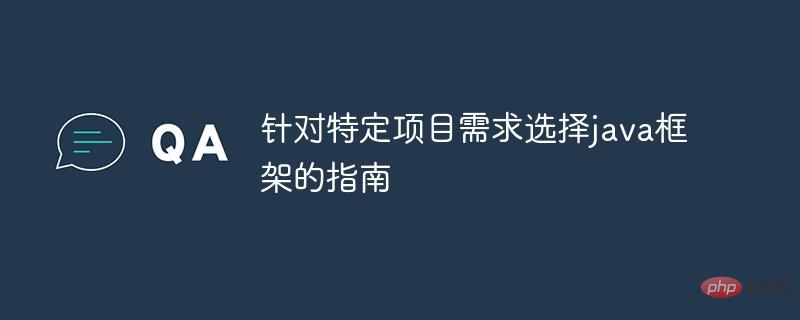A guide to choosing a java framework for specific project needs
Choose a Java framework based on project needs: determine project size, business domain, performance requirements, and team skills. Consider popular Java frameworks such as Spring Framework, Hibernate, JUnit, JAX-RS, and Jakarta EE. Choose the right framework based on your requirements like Spring Framework as it offers comprehensive functionality, easy ORM, and feature-rich web modules.

A guide to choosing a Java framework: Make informed decisions based on project needs
In Java development, choose the right framework critical to the success of the project. This article provides a comprehensive guide to help you choose the right Java framework based on your specific project needs.
Determine project requirements
Before choosing a framework, it is crucial to clarify the specific needs of the project. Key factors to consider include:
- Project size and complexity: Large, complex projects require feature-rich frameworks, while small, simple projects can use lightweight frameworks.
- Business Domain: Some frameworks are optimized for specific industries or application domains (e.g., Spring Boot for web development).
- Performance requirements: The efficiency and scalability of the framework are key considerations, especially for high-performance applications.
- Develop team skills: Consider your team’s framework experience and skill level.
Popular Java Frameworks
After assessing your project requirements, you can consider the following popular Java frameworks:
- Spring Framework: A full-stack framework that provides comprehensive functionality, including dependency injection, transaction management, and web application development.
- Hibernate: An ORM framework that makes it easy for Java code to interact with databases.
- JUnit: A testing framework for writing unit tests and integration tests.
- JAX-RS: A RESTful web services API.
- Jakarta EE: An enterprise Java platform that provides enterprise-class features such as EJB and JMS.
Practical Case
Let us consider the example of an e-commerce website. The website requires the following features:
- Manage product catalogs and orders.
- Provide user accounts and authentication.
- Process online payments and returns.
Based on these requirements, Spring Framework is a suitable framework because it provides:
- A comprehensive dependency injection system with for easy management of application components.
- An easy-to-use ORM module for interacting with relational databases.
- A feature-rich web module for building RESTful web services and handling form submissions.
Conclusion
By following the steps outlined in this guide, you can choose the right Java framework based on your specific project needs. By considering the project's size, complexity, business domain, performance requirements, and development team skills, you can make an informed decision that ensures the success of your application.
The above is the detailed content of A guide to choosing a java framework for specific project needs. For more information, please follow other related articles on the PHP Chinese website!

Hot AI Tools

Undresser.AI Undress
AI-powered app for creating realistic nude photos

AI Clothes Remover
Online AI tool for removing clothes from photos.

Undress AI Tool
Undress images for free

Clothoff.io
AI clothes remover

AI Hentai Generator
Generate AI Hentai for free.

Hot Article

Hot Tools

Notepad++7.3.1
Easy-to-use and free code editor

SublimeText3 Chinese version
Chinese version, very easy to use

Zend Studio 13.0.1
Powerful PHP integrated development environment

Dreamweaver CS6
Visual web development tools

SublimeText3 Mac version
God-level code editing software (SublimeText3)

Hot Topics
 Square Root in Java
Aug 30, 2024 pm 04:26 PM
Square Root in Java
Aug 30, 2024 pm 04:26 PM
Guide to Square Root in Java. Here we discuss how Square Root works in Java with example and its code implementation respectively.
 Perfect Number in Java
Aug 30, 2024 pm 04:28 PM
Perfect Number in Java
Aug 30, 2024 pm 04:28 PM
Guide to Perfect Number in Java. Here we discuss the Definition, How to check Perfect number in Java?, examples with code implementation.
 Random Number Generator in Java
Aug 30, 2024 pm 04:27 PM
Random Number Generator in Java
Aug 30, 2024 pm 04:27 PM
Guide to Random Number Generator in Java. Here we discuss Functions in Java with examples and two different Generators with ther examples.
 Weka in Java
Aug 30, 2024 pm 04:28 PM
Weka in Java
Aug 30, 2024 pm 04:28 PM
Guide to Weka in Java. Here we discuss the Introduction, how to use weka java, the type of platform, and advantages with examples.
 Armstrong Number in Java
Aug 30, 2024 pm 04:26 PM
Armstrong Number in Java
Aug 30, 2024 pm 04:26 PM
Guide to the Armstrong Number in Java. Here we discuss an introduction to Armstrong's number in java along with some of the code.
 Smith Number in Java
Aug 30, 2024 pm 04:28 PM
Smith Number in Java
Aug 30, 2024 pm 04:28 PM
Guide to Smith Number in Java. Here we discuss the Definition, How to check smith number in Java? example with code implementation.
 Java Spring Interview Questions
Aug 30, 2024 pm 04:29 PM
Java Spring Interview Questions
Aug 30, 2024 pm 04:29 PM
In this article, we have kept the most asked Java Spring Interview Questions with their detailed answers. So that you can crack the interview.
 Break or return from Java 8 stream forEach?
Feb 07, 2025 pm 12:09 PM
Break or return from Java 8 stream forEach?
Feb 07, 2025 pm 12:09 PM
Java 8 introduces the Stream API, providing a powerful and expressive way to process data collections. However, a common question when using Stream is: How to break or return from a forEach operation? Traditional loops allow for early interruption or return, but Stream's forEach method does not directly support this method. This article will explain the reasons and explore alternative methods for implementing premature termination in Stream processing systems. Further reading: Java Stream API improvements Understand Stream forEach The forEach method is a terminal operation that performs one operation on each element in the Stream. Its design intention is






